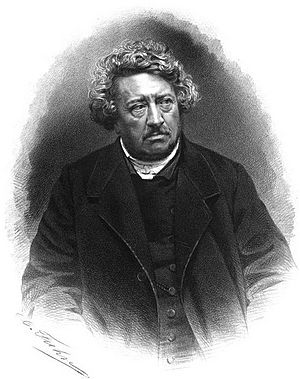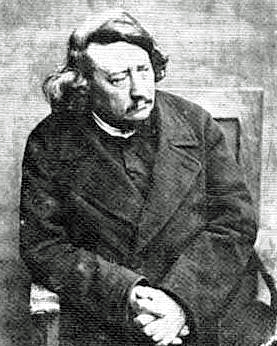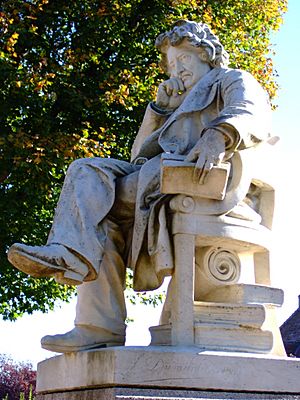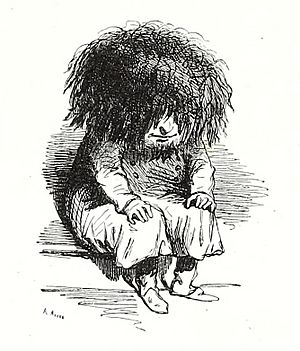Pierre Leroux facts for kids
Quick facts for kids
Pierre Leroux
|
|
|---|---|

Leroux, 1865
|
|
| Born | Pierre Henri Leroux 7 April 1797 Paris, France |
| Died | 12 April 1871 (aged 74) Paris, France |
| Occupation | Philosopher, economist |
Pierre Henri Leroux (born April 7, 1797 – died April 12, 1871) was an important French philosopher and economist. He was born in Bercy, which is now part of Paris. His father was an artisan, meaning he was skilled in making things by hand.
Pierre Leroux's Life
Pierre Leroux's schooling stopped when his father died. This meant he had to work to support his mother and family. He first worked as a mason, building with stone, and then as a compositor, someone who arranges type for printing.
Later, he helped start a newspaper called Le Globe. By 1831, this newspaper became the official voice of the Saint-Simonian community. This was a group of thinkers who believed in social reform. Leroux became a key member.
However, in November 1831, he left the Saint-Simonians. This happened when their new leader, Prosper Enfantin, started teaching new ideas about women's rights and spiritual leadership.
In 1834, Leroux wrote an essay called "Individualism and Socialism." In this work, he introduced the word "socialism" into French political discussions. Socialism is a way of thinking about how society should be organized, often focusing on equality and community.
In 1838, Leroux and Jean Reynaud, who had also left the Saint-Simonians, started the Encyclopédie nouvelle. This was a new encyclopedia. Leroux wrote articles for it, including "On Equality" and "Refutation of Eclecticism," which were later published as separate books.
In 1840, he published his main work, De l'humanité (meaning "On Humanity"). This book explained his ideas fully and became a key text for a group called the Humanitarians. In 1841, he started another magazine, the Revue indépendante, with help from the famous writer George Sand. She was very influenced by Leroux's ideas, and some of her novels, like Consuelo, show this influence.
During the Revolution of 1848, a big uprising in France, Leroux declared the republic in the town of Boussac. He became the mayor of Boussac on February 25. He was then elected to the Constituent Assembly and later to the Legislative Assembly. In these assemblies, he sat with other radical socialist politicians. His speeches were sometimes seen as too abstract or mystical.
Leroux was against Louis Bonaparte, who later became Emperor Napoleon III. After Bonaparte's coup d'état (a sudden takeover of power) in 1851, Leroux had to leave France. He moved with his family to Jersey, an island, where he worked on farming experiments. He also wrote a long poem about society called La Grève de Samarez.
He returned to Paris in 1869 when a general amnesty (a pardon for political exiles) was declared.
Pierre Leroux's Ideas
Leroux's main philosophical idea was the "triad." He believed that everything in the world, including God and humans, could be understood in groups of three. For example, he said that in God, these three parts are "power, intelligence, and love." In humans, they are "sensation, sentiment, and knowledge."
Some people described Leroux as a Protestant. His religious beliefs were pantheistic, meaning he believed that God is in everything and is the same as the universe. He did not believe in a traditional afterlife. Instead, he thought that souls might go through a process called metempsychosis, where they are reborn into different bodies.
In terms of how society should work, he believed in the importance of the family, the country, and property. However, he felt that these things, as they existed then, had too much "despotism" (unfair control). He imagined ways to change them so that families would not have strict heads, countries would not have controlling governments, and property would not be based on the idea of absolute ownership. In politics, he strongly supported complete democracy, where everyone is equal.
See also
 In Spanish: Pierre Leroux para niños
In Spanish: Pierre Leroux para niños
- Liberté, égalité, fraternité
- French demonstration of 15 May 1848
- Circulus (theory)
 | Misty Copeland |
 | Raven Wilkinson |
 | Debra Austin |
 | Aesha Ash |




